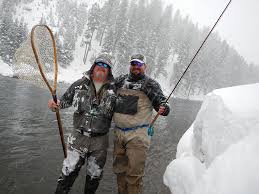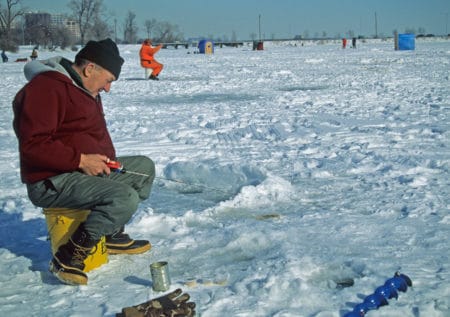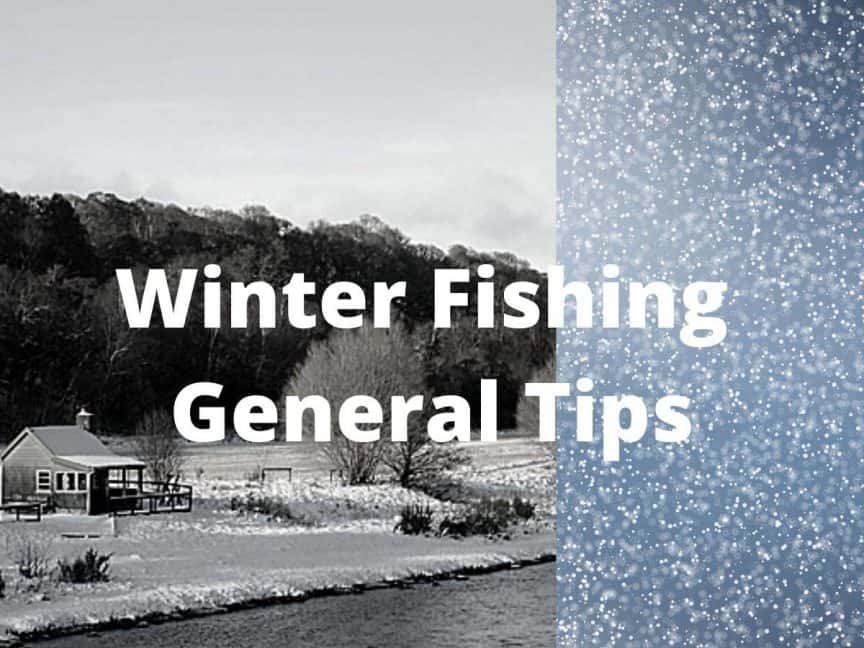Fishing has been known to have a whole host of advantages. Many people love fishing even in winter. Winter fishing tips will definitely help everyone who is thinking to take the challenge of fishing this winter.
Fishing builds up your strength, promotes immune system health, supports heart health, and helps encourage mental health resilience, especially when fishes aren’t biting. This is even more so with winter fishing. Winter fishing is a favorite pastime for many people, many of which have many benefits. Some of these benefits include:
- little to no competition with boaters and fishers
- Bigger fishes available such as bass and trout
- The quiet
- The beautiful surroundings during the winter
- Unique activities such as ice fishing
But despite this, there are many challenges to fishing in the winter. In fact, there aren’t many fishermen who would take up fishing in the winter, especially with the low temperatures and the lack of a variety of fishes. What’s more, if you don’t know how to fish in the winter, you may end up with nothing. As such, below are ten tips for fishing in winter.
Winter Fishing Tips That Everyone Must Know
1. Find A Good Spot
No matter what season you decide to go fishing, make sure that you find a good spot to find fish. This is the most important part of winter fishing tips. By looking at a variety of different wildlife resources, you’ll be able to determine just which spots are excellent for catching fish.

Winter Fishing Tips
Despite this, it’s also important to know the conditions of the water. For example, overflowing rivers may not be the best way to find fishes, not only because of the difficulty but also because there could be debris and other water wastes that may make it potentially dangerous.
You can do this by doing research ahead of time. Just by looking on the internet alone, you’ll be able to find locations that suit your needs.
Questioning the locals around the area you’re interested in is also a good way to find great spots and other services that could potentially benefit you. For instance, if you’re going winter fishing up North in the Great Lakes region, it’d be best if you talked with some of the fishing stores around there.
2. Pick the Right Time
Generally speaking, with winter comes low temperatures and the potential for a storm. Make sure when you plan your trip, keep an eye on the weather. Remember to go when you aren’t at risk to be caught up in conditions that may be dangerous to you.
However, it’s also important to remember that weather fronts are also important when it comes to fishing. Do this by looking at the forecast days ahead of when you want to go, and plan to go sometime in the afternoon. That way, you maximize the chances that you would catch something.
3. Be Prepared
Despite the loveliness of the silence during the winter, oftentimes, many emergency services will not be available during this time. As such, make sure you come prepared to deal with any situation.
Bring high-protein foods such as granola bars, and wear plenty of layers to keep warm. Don’t forget about a pair of quality boots for winter. If you go for ice fishing, good ice fishing boots will make the difference.
What’s more, bring a friend or two just to be safe. What’s more, powering any electronic devices, such as a cell-phone, fish finder with maps, and GPS, can help you navigate your way back home in case you get lost.
4.Know Your Prey
Winter is a popular time for bass fishing. This is because basses are cold-blooded creatures, so their patterns will depend on the cold water currents. For instance, many of the basses will feed less due to their lower metabolisms.
As such, it’s important to bring bait that can attract them, such as Jack’s Juice. This will lure some of them out. You can also slow down with whatever you’re using to catch these fishes. As such, you have to be careful.
An example of this would be knowing the water temperature. Typically speaking, when the water is around 60 degrees, the bass is able to be lured in by a variety of lures.
During the winter, approximately 50 degrees is when the bass will have slowed down enough to where they may still chase some bait. When it drops to 40 degrees is when fishermen have a hard time catching anything.
5. Use the Right Lure
Bass fish have been known to be selective when it comes to lures. Some say that bass fish won’t waste time and energy trying to catch a small fish, while others have stated that catching and eating smaller fish will tend to be more energy-efficient.
Like any good fisherman, the key is to diversify. Switch between big lures and small lures so that you can maximize the chances you have to catch a fish. Remember to use natural colors so that it would seem realistic to the fish.
For example, many agree that bass won’t chase much of anything in cold waters. Even so, lures such as grub can be an effective way to lure bass in. Move to an area with steep, chunky rocks, then cast the grub into the water, giving bass the opportunity to reach the grub.
You can also use football-head jigs or colorful baits in order to catch your fish’s attention. Using lures such as jigs and spinnerbaits work just as well when similar techniques are applied to them.
6. Keep Moving
Fishes are easier to see when it comes to open water. This, in turn, can result in you know exactly where other fishes are. This is why winter fishing is especially advantageous; many people aren’t out fishing during the winter, so you can easily track the fishes you want.
While moving can be difficult, especially with ice equipment, recent improvements made to this equipment has allowed fishermen, specifically anglers, to move without hesitation. What’s more, there are shelters available for winter fishermen that can help them move.
7.Have the Right Equipment

Ice Fishing
Typically speaking, before you can go to catch any fishes, you need to have the right equipment. The most fundamental fishing equipment are obvious, such as:
- a fishing pole and rod
- a reel
- hooks
- baits
The type of equipment you use also depends on the type of fishing you go to. For example, if you’re going to go ice fishing, be sure to bring light gear, as well as maps and location devices so that you know where the fishes are. Some of this equipment includes but aren’t limited to:
- GPS
- sonar units
- Ice fishing shelters
- ice saws
- tip-ups
Having the right GPS fish finder combo can be awesome for planning, security, and fishing with more information. With winter fishing, you’ll have to make sure that your rods and reel doesn’t freeze, that the bait is in good condition.
Make sure that everything works just as fine so that when you do go out to fish, nothing breaks. If you don’t have any equipment or feel that your equipment is just too old, you can research shops that can loan you fishing equipment.
8. Use the Right Techniques
When it comes to winter fishing, you have to make sure that you’re using the right techniques to lure in fish. For example:
- Soft plastic fishing is a technique you can use when you’re trying to catch freshwater bass. This technique has you move the bait at the bottom before allowing it to come up, then letting it slowly sink back down again. When you do this, you give fish enough time to react to the bait. While this requires patience, in the end, it’s worth it.
- Another technique you could use specifically deals with rivers. You can use live bait and attach it to a California rig, where you can cast it off with the currents.
- Switching baits and experimenting on other lures can be a good way to lure in other fishes.
No matter the technique, make sure that you understand just which techniques work with each lure. Take into account the type of waters you’re dealing with, as well as the time of day you’re going fishing.
9. Find the Right Waters
The weather will often impact just where fishes are found, as well as what time they may be out. But more than this is the fact that the type of water can also affect just where fishes are found, as well as what kinds of lures and techniques you use to draw them in. For example:
- When you’re fishing in rivers, you have to think about where fishes will hide. You’re going to have to try to find calmer waters, as well as rock piles or islands. When you find these spots, you’ll more than likely find a whole host of fish right there.
- Whenever you’re fishing in lakes, you can almost be certain you’ll find schools of fishes. However, when you’re fishing in the winter, you have to make sure that you know where the cool and warm waters are to make sure that you can catch fish.
- Ice fishing is a unique way of fishing that allows you to catch fish through a hole in the ice. While the equipment is a bit hard to handle at times, ice fishing can result in the catching of a variety of different fishes, depending on the time. What’s more, you’re going to have to understand the thickness of the ice before knowing where to make your hole. Without knowing the proper Ice fishing tips and tricks, it may be a bit difficult to fish on the ice.
10. Be Patient
When fishing in the winter, it can be hard to fight the urge to rush out to the waters and catch as many fish as you can.
However, because of the slow metabolism in fish, as well as the cold mornings, sometimes it’s better to just be patient. Fish are often unpredictable, and even if you follow all the techniques on this list, fishes might just not bite. If you want to improve your patience:
- Concentrate on the movement of the rod
- Move around and take in natural sights
- Don’t think about the bait
Conclusion
Winter fishing is a great way you can utilize your time. From the advantages of having no competition to the fact that there are many health benefits to fishing, it’s clear that winter fishing is wonderful, though often overlooked, a hobby that not only can be fun but can catch many fishes as well. Even so, it can be quite difficult, whether it be the weather, the lack of fishes, or even the large amount of patience required.
However, by using and knowing these winter fishing tips, not only you will be prepared for winter fishing, but you’ll also find the experience more enjoyable. For summer days there are more water funs and activities like boating, kayaking, river floating in a tube and many more. In winter we can have fun and take care by winter fishing.
Remember that although winter fishing isn’t considered an ideal season for fishing, needless to say, many have managed to successfully catch fishes. Whether it be through patience, using the right lures and techniques, or even making sure that their equipment works, winter fishing has been proven to be beneficial to many fishermen.



